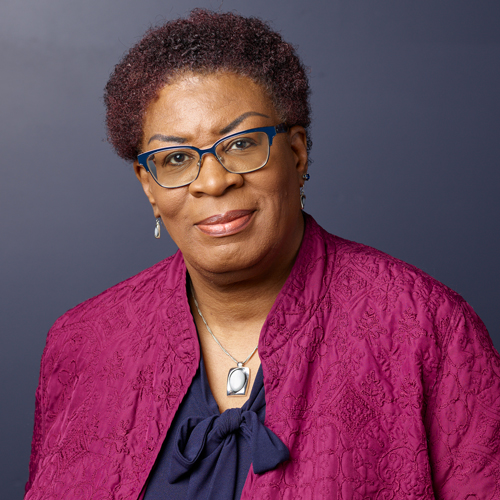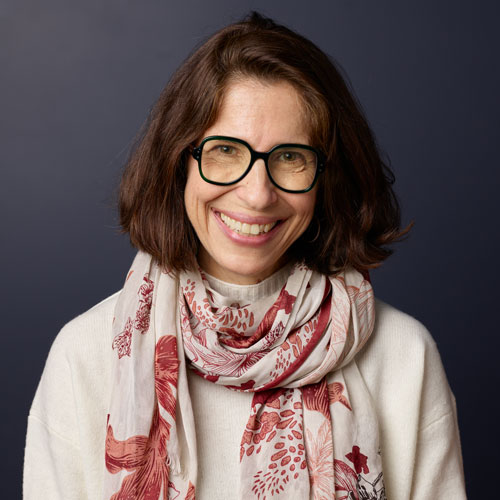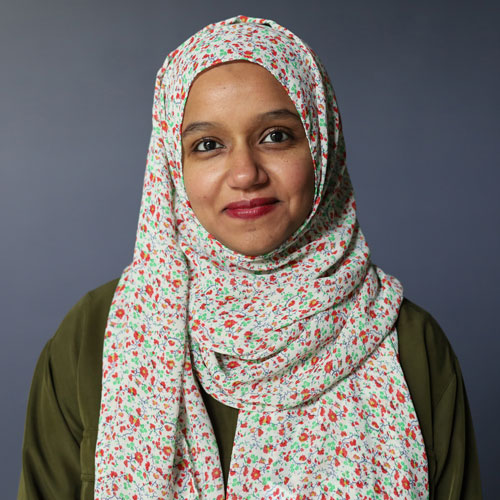Inclusion, Advocacy, and Community
At a time when access and inclusion are not equal, we work to provide programs, services, and pathways that lead to success for historically underserved students while also fostering learning opportunities for allies.
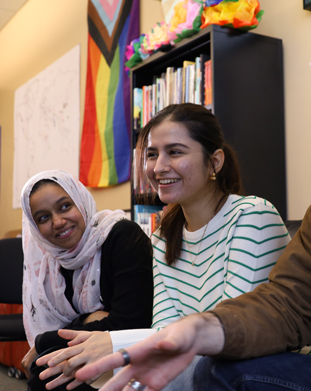
Land Acknowledgment
We acknowledge that Cascadia College resides on the traditional and occupied land of the Coast Salish Peoples – past, present, and future. We honor their connection to the region, pay respect to Coast Salish Elders past and present, and join in solidarity through their struggles with continued systemic oppression. We commit to care for the land and water, and center equity at the core of our learning. We ground our continual efforts to collaborate with tribal communities by listening, learning, and always keeping the well-being of tribal communities in mind.
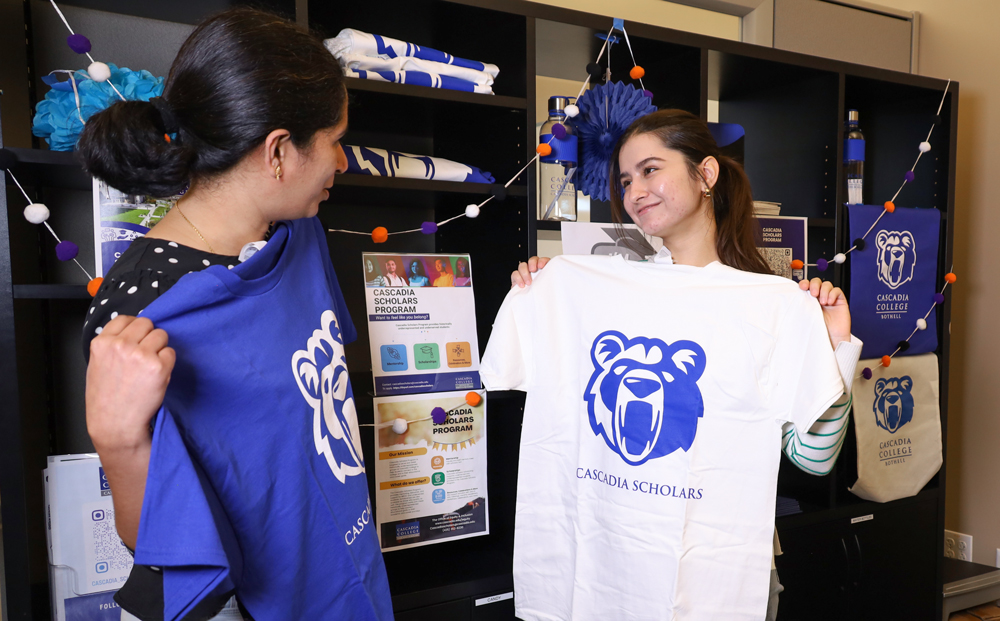
Cascadia Scholars Program
This program works with underrepresented and marginalized students to provide mentorship, scholarships, and resources throughout their career at Cascadia to create community and help connect academics to career goals.
Learn MoreCenter for Inclusion, Advocacy, and Community
The Center for Inclusion, Advocacy, and Community is where all ethnicity, culture or nationality, religion, physical ability, and identity are welcome and celebrated. Visit us, attend events, make social connections, and learn to become change agents and allies.
Learn More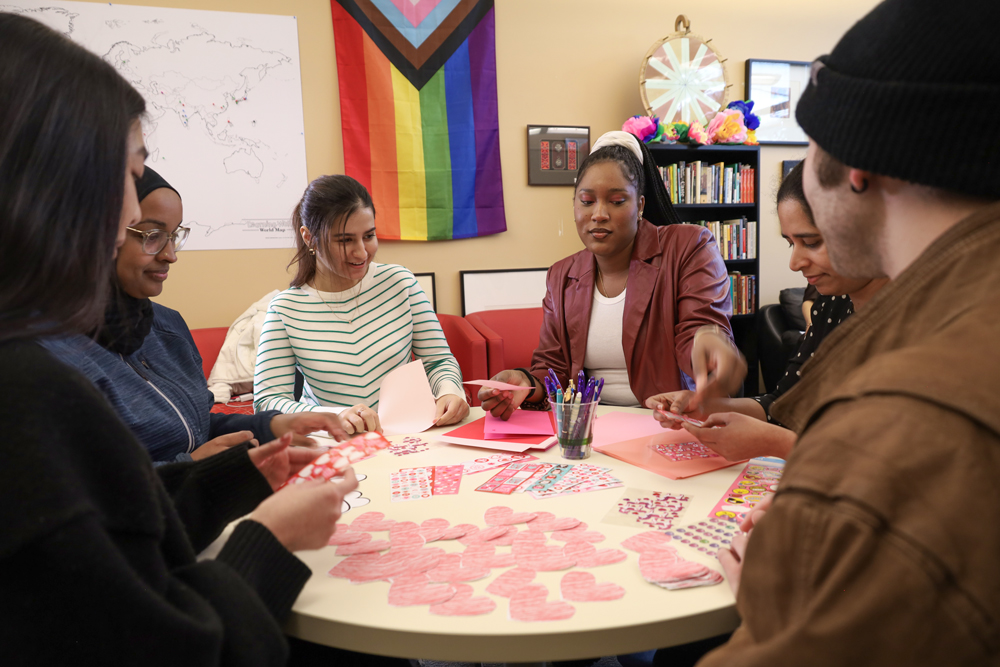
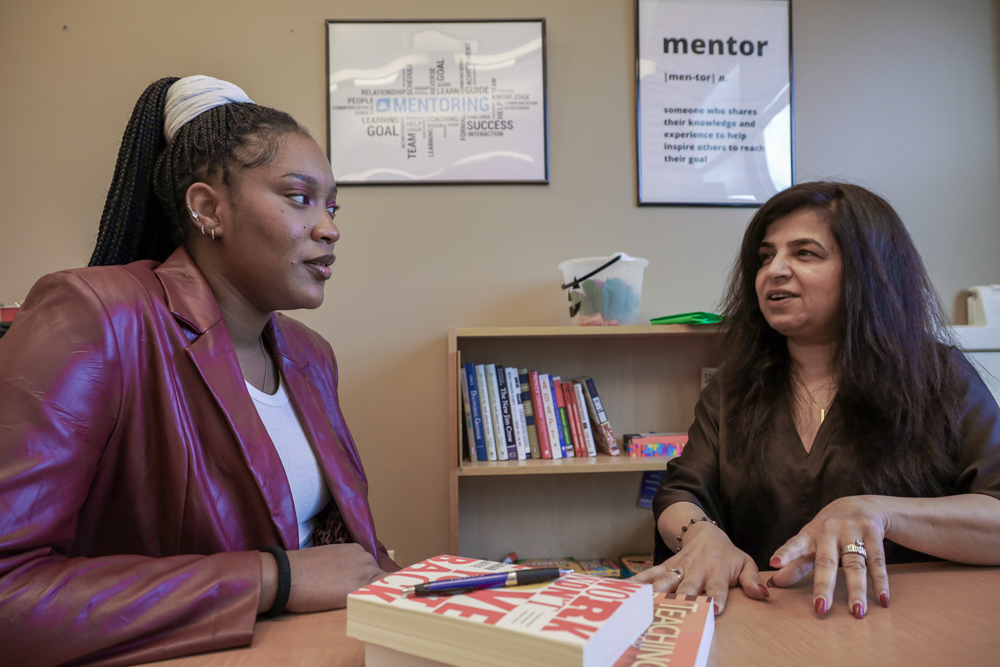
Foundations of E&I Course
Guiding Principles
- Policies
- Inclusive Campus Pledge
- DEI Strategic Plan
- Campus Climate Assessment Plan
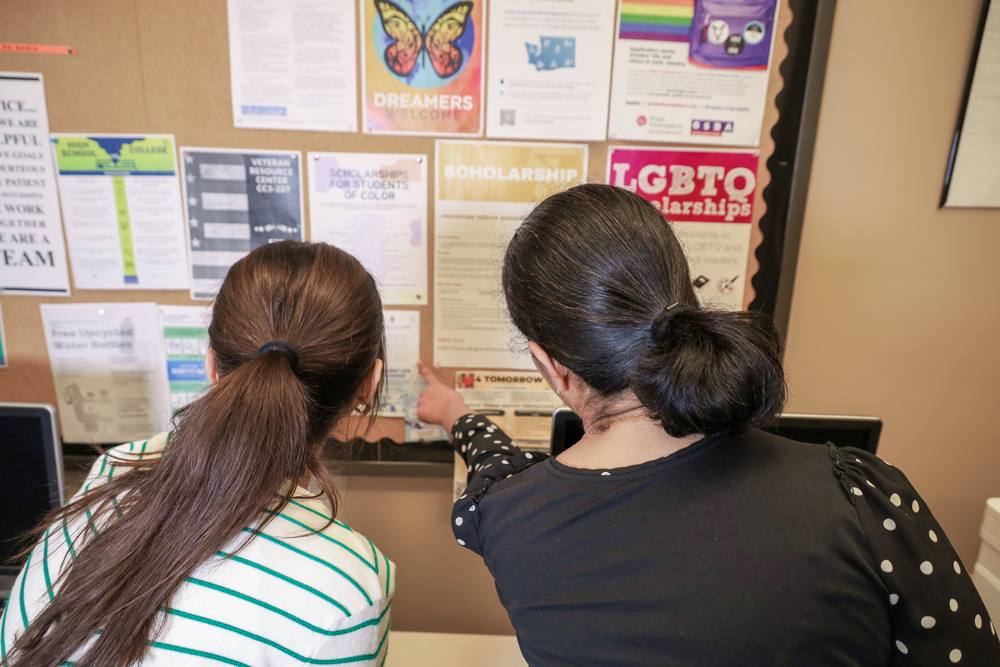
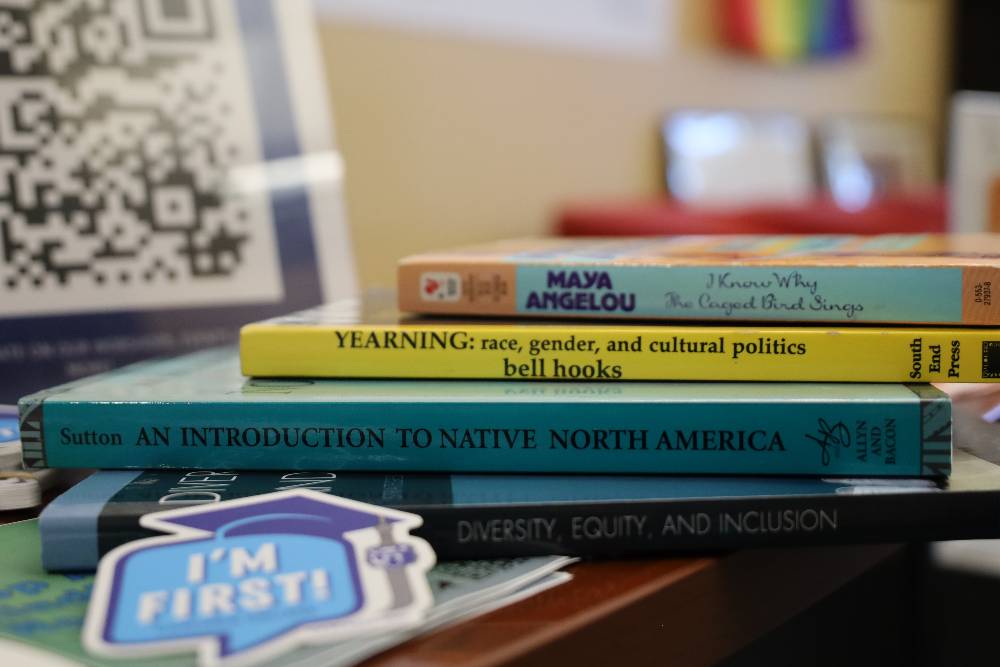
E&I Council
The purpose of the E&I Council is to serve as an advisory group for the Office of Equity and Inclusion. The Council also helps to move campus equity and inclusion efforts forward, uphold and model the values of equity and inclusion, continuously deepen personal analysis of issues and concepts pertaining to racial justice and equity, and discuss supports and solutions as issues and concerns arise.
Learn MoreCascadia Scholars Program Offerings

Resources
Definitions
Cascadia College values the rich diversity of our students, staff, and faculty and strives to meaningfully include all of the campus community in collectively building a college rooted in diversity, equity, and social justice.
These definitions provide a broad overview of E&I terms that most will come across. They are not the only definitions that can be found; rather they are ones that align with Cascadia's approach to this work. They allow our campus community to form a common language around E&I. Further exploration of and dialogue about these definitions is encouraged to expand understanding and to bring in other wisdom, ideas, and perspectives.
Diversity
Individual differences (personality, ideas, communication style, learning style, way of dress, life experiences, etc.) and group/social differences (race/ethnicity, culture, class, gender, sexual orientation, country of origin, ability, religion, political affiliation, other affiliations). Refers not only to dimensions of individual and group/social difference, but also the intentional efforts and conscious practices to appreciate difference, prevent discrimination, and ensure representation at all levels organizational leadership and decision-making.
Equity
Access to the resources, networks, education, opportunities, conditions, and support each individual needs to survive/succeed based on their goals. Supporting each person in reaching their full potential while also recognizing each person needs something different to do so. Recognizing and seeking to dismantle systems of oppression that keep people or groups from being included, achieving outcomes, and reaching their full potential.
Inclusion
The action or state of being included within a group or structure with authentic and empowered participation and a true sense of belonging. Inclusion is active, intentional, and ongoing engagement with diversity in curriculum, policies, procedures, project development, teamwork, etc. Inclusion notices individual and groups not represented within a system, process, etc. and seeks to increase representation and connect people in ways that increase awareness, knowledge, and understanding.
Cultural Competence
A process of learning about, interacting with, appreciating, understanding, and knowing how to support people from other cultures, thereby broadening the ability to participate in a multicultural community effectively and respectfully. Cultural competence is essential in doing less harm to marginalized groups, to support those around us, and to make progress on diversity, equity, and inclusion.
Culturally Appropriate
Interacting with, engaging, and affirming individuals and communities in an inclusive, kind, respectful, and sensitive manner. Breaking down barriers and intentionally seeking to relate better with people and build supportive and mutually beneficial relationships and connections. Being culturally appropriate comes with increased cultural competence and exposure to diverse individuals and communities.
Historically Marginalized Communities
To be marginalized is the process of becoming or being made marginal within a larger group setting, with the effect of making a group or class of people less important or relegated to a secondary position. Marginalization is an experience of groups who are excluded from or denied political, economic, and social inclusion or equity in society, and hence, relegated to its margins. It can also refer to an individual who is rendered voiceless or irrelevant. Historically marginalized communities are those communities that have repeatedly and consistently experienced marginalization throughout history.
Communities of Color
The acronym BIPOC (Black, Indigenous, People of Color) is used at Cascadia College rather than communities of color or POC (people of color). This is because not all communities and people of color in the United States face the same levels of injustice. BIPOC is used to highlight that Indigenous and Black or African American people have unique relationships to whiteness compared to other people of color in the United States. They face the worst consequences of systemic white supremacy and settler colonialism, and their challenges and opportunities deserve recognition.
Low-Income Communities
This is a formal term with definitions and those who meet the definition determined by the U.S. Census and other Federal government agencies. Cascadia College aims to contextualize low-income communities by viewing systems through the lenses of power, privilege, and oppression because low-income communities do not exist without those forces at play. With an understanding of power, privilege, and oppression communities can work collaboratively to dismantle oppression, redistribute power, and use privilege for social change.
Community Organization
An organization with a mission and vision of making desired improvements to a community through the ideas, goals, and solutions of those the organization is aiming to positively impact.
Conversation Agreements
Show up for each other with shared intent – Engage with sincerity, humility, and curiosity; listen deeply and seek to lift each other up on the journey
Use I statements – Speak only for yourself and not on the behalf of a collective
Hold space for growth – Each person represents a different life experience and point of entry; questions are welcome and received with support and encouragement
WAIT (Why Am I Talking) – If you are used to having your voice heard, listen instead of talking
WANT (Why Am I Not Talking) – If you are not used to having your voice heard, give it a try
Maintain cooperative space vs competitive space – Seek to be humble and to understand rather than trying to prove yourself
Remember, we are on the same team, the team striving toward equity – Please work with us toward our shared vision; we are here to further your cause
Expect and accept non-closure – This work will never be done fast enough or perfect enough; there will be loose ends that get tidied later
Maintain confidentiality by not sharing, talking about, or otherwise relaying people’s information or stories with others
Honor shared governance – Ideas and requests made during the Town Hall will go through the usual processes of shared governance, this is to ensure that the ideas and requests align with Cascadia values and meet the needs of the community
To meet with Chari Davenport
- Drop-In hours are on the third Monday of each month from 10am-11am
- In person at (CC3-134) or visit the Zoom Room
- You may also email equity@cascadia.edu or cdavenport@cascadia.edu
To visit the Diversity & Equity Center
- Stop by CC1-002
- You may also contact Ana Nina, Director of Inclusion, Advocacy, and Community Programs at anina@cascadia.edu
- Contact the E&I Council through Chari Davenport at cdavenport@cascadia.edu
- Contact HR Director, Ifrah Mohamed, at imohamed@cascadia.edu
- Contact HR Director, Jason Rue, at jrue@cascadia.edu
- Cascadia Bias and Incident Response Team - Equity & Inclusion (cascadia.edu)
- Mental Health services for Cascadia employees are available through the Employee Assistance Program (Wellspring) Employee Assistance Program (Wellspring)
- Additionally, UWB Counseling Center provides free mental health services to Cascadia students
- Finally, remember, if you see something – say something - Call 425.352.5359 for Campus Safety & Security Campus Services Campus Services (cascadia.edu)
